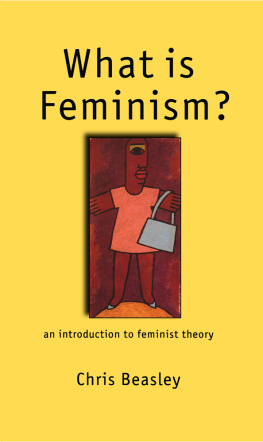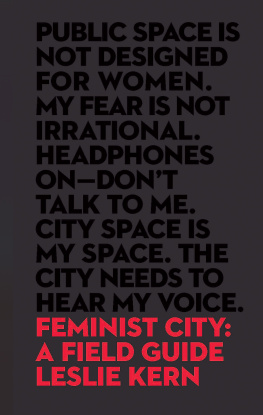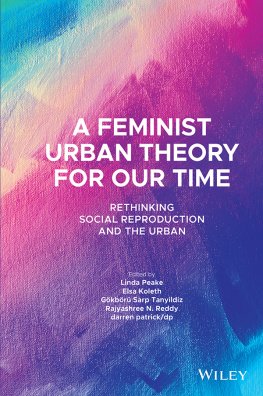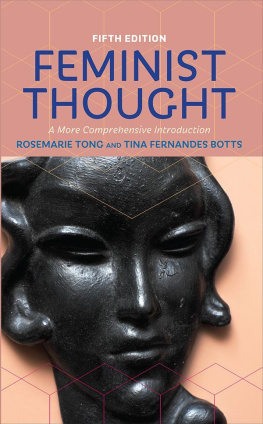A Feminist Glossary of Human Geography
A Feminist Glossary of Human Geography
Edited by
Linda McDowell
and
Joanne P Sharp

First published in 1999 by
Arnold, a member of the Hodder Headline Group,
Co-published in the United States of America by
Oxford University Press Inc.
This edition published 2014 by Routledge.
2 Park Square, Milton Park, Abingdon, Oxon OX14 4RN
711 Third Avenue, New York, NY 10017
Routledge is an imprint of the Taylor & Francis Group, an informa business
1999 Selection and editorial matter Linda McDowell and Joanne P Sharp
All rights reserved. No part of this publication may be reproduced or transmitted in any form or by any means, electronically or mechanically, including photocopying, recording or any information storage or retrieval system, without either prior permission in writing from the publisher or a licence permitting restricted copying. In the United Kingdom such licences are issued by the Copyright Licensing Agency: 90 Tottenham Court Road, London W1P 9HE.
British Library Cataloguing in Publication Data
A catalogue record for this book is available from the British Library
Library of Congress Cataloging-in-Publication Data
A catalog record for this book is available from the Library of Congress
Production Editor: Julie Delf
Production Controller: Iain McWilliams
Cover Design: T. Griffiths
ISBN 0 340 74143 0
List of Contributors

MB | Morag Bell University of Loughborough |
AMB | Alison Blunt University of Southampton |
LB | Liz Bondi University of Edinburgh |
AB | Alistair Bonnet University of Newcastle |
SB | Sophie Bowlby University of Reading |
HC | Hazel Christie Heriot-Watt University |
LD | Lorraine Dowler Pennsylvania State University |
ND | Nancy Duncan University of Cambridge |
CD | Claire Dwyer University College London |
JF | Jo Foord University of North London |
FG | Flora Gathorne-Hardy University of Cambridge |
NG | Nicky Gregson University of Sheffield |
PJ | Peter Jackson University of Sheffield |
CJ | Craig Jeffrey University of Edinburgh |
AJ | Andrew Jones University of Cambridge |
RK | Rebecca Klahr University of Cambridge |
LK | Larry Knopp University of Minnesota |
NL | Nina Laurie University of Newcastle |
JL | Jo Little University of Exeter |
LM | Linda McDowell London School of Economics |
CM | Cathy McIlwaine Queen Mary & Westfield College, University of London |
DM | Doreen Mattingly San Diego State University |
PM | Paula Meth Sheffield Hallam University |
KM | Karen M Morin Bucknell University |
HN | Heidi Nast DePaul University |
CN | Caroline New Bath College of Higher Education |
RHP | Rachel Pain University of Northumbria |
HP | Hester Parr University of Dundee |
BP | Bronwen Parry University of Cambridge |
LP | Linda Peake York University, Canada |
DP | David Pinder University of Southampton |
RP | Rosemary Pringle University of Southampton |
SAR | Sarah Radcliffe University of Cambridge |
SR | Suzanne Reimer University of Hull |
JR | Jenny Robinson Open University |
JS | Joanne P. Sharp University of Glasgow |
FS | Fiona Smith University of Dundee |
WS | Wendy Somerson University of Washington |
MS | Matthew Sparke University of Washington |
KT | Karen Till University of Minnesota |
BW | Bronwen Walter Anglia Polytechnic University |
JW | Jane Wills Queen Mary & Westfield College, University of London |
Acknowledgements

Thanks to all our friends, colleagues, family and students too numerous to name individually who not only helped us in this particular task but who have also made a difference to how we think about things. The original idea was Laura McKelvies at Arnold: we are not sure whether thanks or curses are the most appropriate acknowledgement.
Introduction

One of the most exciting aspects of working as a geographer in the last few years has been the speed with which the discipline has changed. Perhaps somewhat to the surprise of many of us, geography found itself right in the middle of many of the debates that have dominated not only the social sciences but also the humanities throughout the 1990s. Whether the focus was the increasing connections between places through economic globalisation or cultural innovation, the movement and migration of huge flows of capital and labour, the paradoxical reassertion of local power, politics and identities, or the wholesale challenges to theory and knowledge mounted by amongst others, feminists, postmodernists and post-colonial theorists, geographers had something to say. Indeed, the new sets of concepts that came to the fore in a wide range of disciplines situated knowledge, travelling theory, borderland identities were almost all associated with a recognition of the significance of location and geographical difference. A wide range of new ideas and concepts, more or less familiar to a geographical audience, entered the vocabulary of the discipline and changed the nature of academic debates.
In this glossary, we have tried to capture the nature of the most significant of these changes in the context of feminist debates. As we argued in Space, Gender, Knowledge our companion volume to this one (McDowell and Sharp 1997) feminist theories and debates have changed and expanded in an exponential way since they first became visible in the academy and in wider political movements in the postwar period. Indeed it is sometimes hard to remember the early struggles in geography departments across the world to gain acceptance for feminist work. Feminist students and teachers, courses, book collections and journals are evidence of the current vibrancy and dynamism of feminist geography. This very dynamism, of course, makes it difficult to capture and pin on the page definitions of the key terms in these debates. But in the company of a group of energetic contributors from three subcontinents, this is what we have tried to do.
Next page







